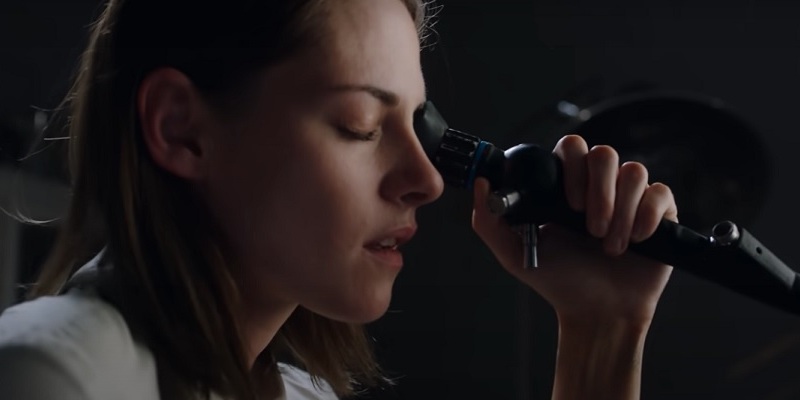
Review by
Eric Hillis
Directed by: David Cronenberg
Starring: Viggo Mortensen, Kristen Stewart, Léa Seydoux, Scott Speedman, Welket Bungué, Don McKellar, Lihi Kornowski,
Tanaya Beatty

It's incredible to think that an entire generation has grown to
adulthood in the time since David Cronenberg last worked in the
fields of sci-fi and horror. In the 20th century Cronenberg was always
labelled a "horror director", lumped in with the likes of John
Carpenter, Wes Craven and George A. Romero. This century has seen him
deliver more grounded films like Eastern Promises and
A History of Violence in what some cynics might view as a
bid for mainstream acceptance, while his son Brandon has taken up the
mantle of making exactly the sort of body-horror movies the family name
had become synonymous with. With Crimes of the Future, Cronenberg returns to the world of body-horror with what might be the
most Cronenbergian movie ever.

"Long live the new flesh," was the slogan of the militant group from
Cronenberg's 1983 thriller
Videodrome. Crimes of the Future shares only its name with the
director's 1970 film, but it does share some thematic elements with
Videodrome and offers a similar catchphrase – "Surgery is
the new sex." Like Videodrome's Max Renn,
Crimes of the Future's protagonist, Saul Tenser (Viggo Mortensen), is in the
business of shocking audiences. The film is set at some point in a
future where most humans have evolved to no longer feel physical pain.
Others have evolved differently. Tenser can feel pain, so much so that
basic functions like sleeping and eating require the use of special
software-enhanced beds and chairs to compensate for his aches and pains.
But Tenser has another gift, the ability to generate tumours. With his
stage and romantic partner Caprice (Léa Seydoux), Tenser is a
performance artist whose act sees former surgeon Caprice remove his
tumours live on stage with the age of an outdated autopsy machine, a
device not too dissimilar from the one Noomi Rapace used to perform an
impromptu abortion in Ridley Scott's Prometheus.
Tenser's act is beginning to grow a little stale, and he's up against
more outrageous performers, like Klinek (Tassos Karahalios), who
can grow ears all over his body. When he's approached by the shifty Lang
(Scott Speedman), he may have an act that will put him back on
the map. Lang's son was murdered by his mother because she considered
him a freak due to his ability to eat plastic. Lang has kept the body
hidden away and wishes Tenser to perform an autopsy on the boy so that
his unique digestive system will be exposed to the world, rather than
being covered up by the authorities, who are dead set against the idea
of humans evolving in what they consider an unnatural manner.

Like Videodrome, Crimes of the Future examines the lengths artists and
entertainers will go to in order to satisfy an increasingly demanding
audience. Both movies seem to take a pop at the sort of people who watch
Cronenberg movies, as though the filmmaker is disgusted by our desires
but can't help but continue to feed them. Tenser literally opens up his
body and gives us part of himself, but it's not enough. What more can an
artist give?
Cronenberg first wrote his script over 20 years ago, but you can see
why he returned to it as its themes will likely resonate a lot more with
a 2022 audience than one from two decades ago. The issue of evolution
here, with the government requiring any new organs to be registered so
they can be kept track of, plays like an explicit allegory for the
current debate around trans rights and the conflict that arises when
someone's right to determine what they do with their own body clashes
with the established rules of existing institutions.

Cronenberg doesn't appear to take any particular side, nor does he
offer any easy answers. Instead he creates a world that is strangely
tangible despite its more fantastical elements, largely because we're
seeing similar issues play out in our own world. With committed
performances across the board and effectively atmospheric use of a
largely deserted nocturnal Athens, the film immerses us in what feels
like a very well thought out near future society. Some elements are left
obtuse and may require further viewings to fully grasp, but we always
feel we're in the hands of a filmmaker confidently presenting ideas that
he's been refining for close to 50 years now. The old flesh is new
again. Long may it live.

